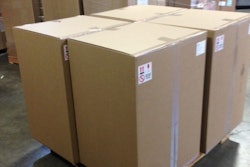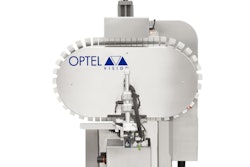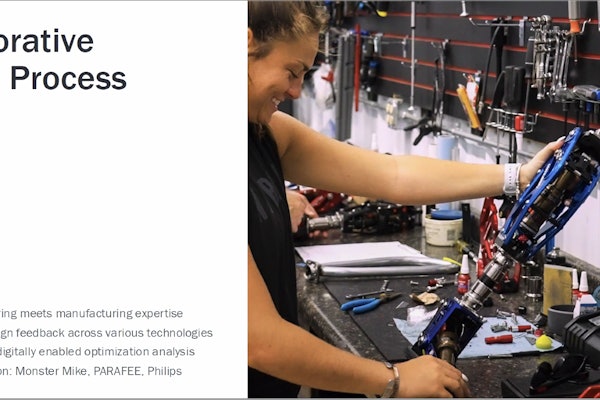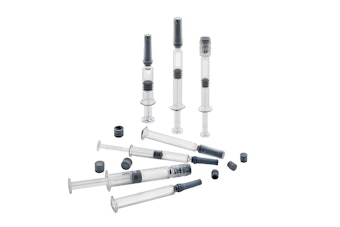Warehousing products can be a costly proposition for medical technology and device manufacturers. It requires leasing and managing a facility and the overhead that goes with that proposition—utilities, insurance against loss or damage, inventory tracking software, shipping coordination, payroll for personnel, and the responsibility to oversee them.
A “drop-ship” program is where firms outsource their warehousing and shipping operations to ICAT Logistics at a flat fee per unit.
Another option is a “stock and ship” program for companies that want ICAT to set up medical carts with their products, and then send the customized carts to clients.
“Our company is growing very rapidly,” explains Mitch McReynolds, Logistics Manager at Ulthera, Inc., a Mesa, AZ-based company whose Ulthera System has received FDA clearance to non-invasively lift skin on the neck, chin and brow. “ICAT’s been a good partner for that growth.”
For both its drop-ship and stock-and-ship programs, ICAT warehouses the products near where they are produced—inventorying each box when it comes in, and managing that inventory—then ships on demand when customers order them.
ROI from Drop-Ship, Stock-and-Ship programs
Medical technology clients can realize economies from using one of these programs. By keeping the warehousing local, companies can avoid excess shipping costs. Finding a logistics partner also means eliminating the cost of overhead and salaries that go with having an internal department that does this work.
A prominent medical device business headquartered in the Midwest recently enlisted ICAT’s help after acquiring a San Francisco-based company. To consolidate its products, the parent company shipped all its acquisition’s purchase orders to Jacksonville, FL—which cost $115 per unit. Individual orders were then shipped from there.
By assigning ICAT a warehouse number, this company was able to realize a savings of 25% to 45%, depending on the ultimate location of the client—and cut transit time in half—by keeping their products near where they were made, and offloading the shipping responsibilities to ICAT.
How manufacturers see outsourcing
Materials Manager Shamayne Gerlich at Given Imaging in Los Angeles, a GI medical device manufacturer and pioneer of capsule endoscopy, has been working with ICAT for the past six years. “They will adjust what they need to do in order to match what you specifically might be looking for. It’s not a situation where you’re locked into one process, and that’s that. They have proven that they can be flexible and responsive when needed,” she said.
For Anthro, an OEM cart and cabinet manufacturer in Portland, OR, the ICAT partnership spans 18 years. “The ‘stock-and-ship’ program is used primarily by our OEM customers, who are buying our product and reselling it with a product they make—typically medical products or lab devices,” says Karen Baker, Anthro’s OEM Channel Manager.
Stock and ship works for OEM customers, Baker says, “because they don’t want to hold that inventory themselves; they don’t have space, they want to take advantage of quantity pricing, or they don’t want to double ship.” Anthro’s customer can buy the product and ICAT will store it for them until they are ready to be shipped directly to the end-user.
“We bill the customer for the product. All of the storage and shipping charges are billed directly from ICAT to our customers, who tell me they really like the system,” she says. “Oftentimes, they want their tailor-made carts to ship quickly.”
At Ulthera, McReynolds evaluated different ways of handling orders, then came up with a program that designates one set per-unit cost that is all-inclusive for storage, handling, and delivery. He also redesigned the packaging to make a pallet that fits the container perfectly, reducing shipment costs.
“Now, ICAT purchases the pallets for me and puts them on as we ship on the containers,” he says.
Overall, McReynolds is pleased. “We all win. I dispatch based on need, and it works out great for him because he has this space available,” he says.
How the Drop-Ship program works
For companies that lack the space to receive, process, and ship their products from their facilities, ICAT can operate as their shipping and receiving department. ICAT can also control the raw materials being delivered to the manufacturers for production—using their carrier, or ICAT’s.
Companies that want to warehouse their products at ICAT then have them shipped to customers, are charged a flat “per-unit” cost that includes storage. Inventory counts are provided to the client’s specifications. Extra preparation for shipping is provided, such as proper pallets, strapping, labeling, and document preparation. Updated spreadsheets for tracking and billing are provided as well.
How the Stock-and-Ship program works
ICAT works with medical device companies that offer turnkey solutions for their customers. For instance, medical carts are manufactured, stored by ICAT and shipped for medical product distributors.
A purchase order will be submitted for a certain number of carts to be built. ICAT will assemble the products or devices on the cart, store them, then pull from the inventory and ship in the quantities needed, on the timeline requested. If a claim occurs, ICAT resolves it.
—Article author Dennis Deming is one of the Agency Owners for the ICAT Logistics office located in Portland, OR. He has worked on the ICAT team for more than 10 years and has 18 additional years of experience in logistics from small package to global solutions. He can be contacted by phone or by email at 503 408 6624 and [email protected].





















